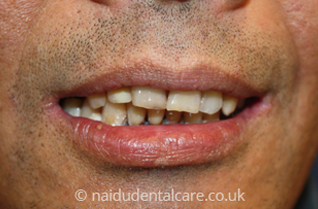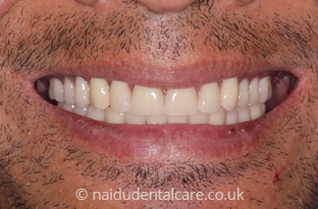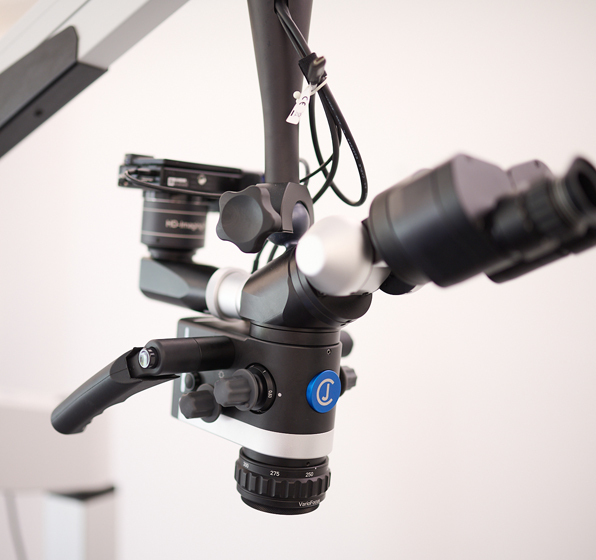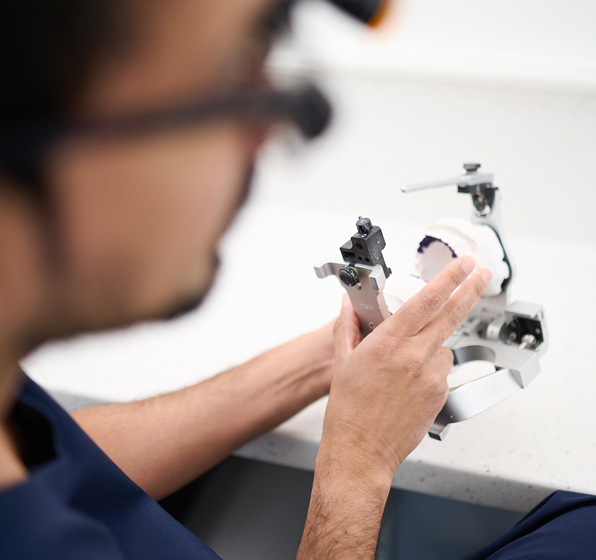
“I have nothing but praise for Addie who made such an effort to get my new dentures right. In the beginning he went through the various options with me in detail and then followed up with that in an email. It's never going to be easy to make a full set of upper and lower dentures and get it right not just in appearance but also in comfort. He listened to all my concerns each time never making me feel rushed. I had many appointments in the quest to get both dentures right for me. I am totally pleased with the finished result and wouldn't hesitate to recommend Addie. All the staff especially Joanne have been extremely polite, professional and helpful at all times."


Unfortunately, a complicated health history and years of medical treatment had left Mr C. with a compromised set of teeth and gums. Over time, all the remaining teeth were extracted and ultimately replaced with a set of complete dentures and giving him the ability to smile again!
Despite advances in the dental profession with the use of implant replacements for missing teeth, in some cases a well-designed and carefully constructed removable denture can be a solution.
A complete or 'full' denture is one that replaces all the natural teeth in the upper or lower jaws whilst a partial denture fills the gaps between the remaining teeth. Both styles of dentures can be made using a base of either metal or acrylic (plastic) and the choice often depends on the health of the remaining teeth and gums.


Apart from replacing the missing teeth, dentures can even improve the facial aesthetics by providing support to your cheeks and lips. After teeth are lost, these areas can often look 'sunken in' or 'sagging.' A denture can support these areas, reduce skin creases and restore your confidence. You could say a 'denture facelift' can improve your smile & profile!
At Naidu & Naidu, we will always continue to provide excellent aftercare for dentures. Every time you return for a regular check-up, we will not just check your teeth and gums, but make sure that your denture is checked to ensure that it is clean, maintained and able to serve you well over the years.


Loose or ill-fitting dentures can be a nuisance and affect your ability to eat and speak with comfort. Although sometimes, the problem can be solved by modifying or remaking the denture, some people have simply lost too much bone over the years to allow a denture to fit well.
There is another option available to solve the problem and stabilise your denture and this is known as an implant overdenture. By placing implants into your jaw, we can use them to anchor your denture into position and allow you to enjoy your favourite foods and smile again confident in the knowledge that your dentures are under your control.
Properly caring for your dentures is essential for keeping them looking their best and avoiding serious oral health problems. The first step in denture care is to properly brush the dentures daily with a soft toothbrush or speciality denture brush. Brush thoroughly, but gently, using a non-abrasive soap or denture paste. Make sure to scrub each surface, both inside and out, as food particles and plaque bacteria can get trapped in these areas. Additionally, this cleaning process will help prevent permanent staining of the plastic material that makes up your dentures.
If you are looking to whiten your dentures like you would natural teeth, this unfortunately cannot be done because of the makeup of the plastic material used to make them. However, there are a variety of over-the-counter cleansers available that can effectively remove most stains from your dentures if used according to the manufacturer’s instructions; just be sure not to use any abrasive materials as this could damage the plastic material used on your dentures. Regularly cleaning and maintaining your dentures can help keep them looking good and maintain better health in the long run.
Sleeping with dentures is a tricky question and the answer depends entirely on an individual's needs and health. Wearing dentures at night is usually not recommended, as it can prevent the gums and bones from getting some much-needed Dentures can be a great way to restore someone’s smile and their ability to chew and eat food without pain or discomfort. While adapting to dentures can take time, most people are able to eventually eat normally with them after they become accustomed to the new appliance. To get used to dentures quickly, it helps to use a small amount of denture adhesive initially on each one so that the dentures don’t move around as much while you learn the best way to use them. When you first start out it’s important not to attempt chewing hard candy or gum as these may cause your dentures to slip or shift out of place due to the sticky residue left behind from the candy or gum. As you gain more practice, however, eating normally will become much easier and second nature for you in no time! rest. On the other hand, there are people who may need their dentures to provide support for their bite or to maintain facial structure when there are missing teeth. In such cases, it may be necessary to keep the denture in place while sleeping.
Regardless of the individual situation, proper oral hygiene should always be practised when wearing dentures during any part of the day. Dentures must be removed every day in order to properly clean all surfaces of the prostheses and use a special denture brush & paste for an even deeper cleanse. Additionally, these removable prosthetics should also be stored safely in water overnight. By following these helpful tips, you can increase your chance of having healthy gums, stable jaw alignment and longer-lasting dentures over time!
Dentures can be a great way to restore someone’s smile and their ability to chew and eat food without pain or discomfort. While adapting to dentures can take time, most people are able to eventually eat normally with them after they become accustomed to the new appliance. To get used to dentures quickly, it helps to use a small amount of denture adhesive initially on each one so that the dentures don’t move around as much while you learn the best way to use them. When you first start out it’s important not to attempt chewing hard candy or gum as these may cause your dentures to slip or shift out of place due to the sticky residue left behind from the candy or gum. As you gain more practice, however, eating normally will become much easier and second nature for you in no time!


Monday 08:00 am - 13:00 pm,
14:00 pm - 18:00 pm
Tuesday to Friday 08:00 am - 13:00 pm,
14:00 pm - 17:00 pm
Saturday - 08:00 am - 13:00 pm
Email: info@naidudentalcare.co.uk
Call us today: 01708 346 540 / 01708 341 587
Address: 132 Gubbins Lane, Harold Wood, Essex RM3 0DP